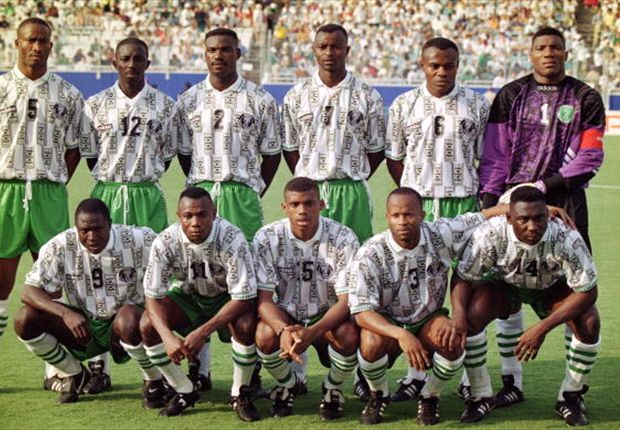The second part of the 3 part series, first part is here
By the 1994 tournament in the USA, Africa now had an extra place and the Nigeria Super Eagles were finally able to take their place among football’s global elite. No African team, before or since, has gone into the World Cup tournament itself surrounded by such hype and fanfare.
Powerful, athletic and skillful, much was expected of the Super Eagles and a “rogue” FIFA ranking just before the tournament that put Nigeria at 5th in the world only heightened the expectations. Cameroon’s fairytale in 1990 had raised the tantalizing prospect of the fulfilment of Pele’s famous prediction that an African team would rule the world before the year 2000.
If any team could, Nigeria’s 1994 team looked the part. And they came painfully close to a deep run in the tournament, offering many memorable moments along the way, many of them revolving around their goal celebrations (with seven, Nigeria matched 1990 Cameroon in terms of goals scored and that still stands as a single tournament record for an African team).
Rashidi Yekini’s iconic in-the-net celebration of their first ever World Cup goal against Hristo Stoichkov’s Bulgaria; taking an early lead against Argentina before being pegged back by Diego Maradona and, in more ways than one, his partner in crime Claudio Caniggia; Daniel Amokachi’s riff on Roger Milla’s goal celebrating dance; Finidi George’s bizarre peeing dog routine against Greece and Jay Jay Okocha’s skill-laden cameo against Italy in the round of 16 encounter in Boston.
Ultimately though, they failed to match even Cameroon’s feat of four years earlier, going out to a late Roberto Baggio inspired comeback against Italy having led for around 70 minutes of the match. Nigeria’s was an auspicious debut…..but they had promised so much more that it was impossible not to be disappointed. Cameroon and Morocco, making up the rest of the African contingent, did little of note and exited in the first round having lost five of the six matches they played between them drawing the other.
France in 1998 saw the debut of a now bloated 32 team tournament with a bounteous 5 places bestowed on Africa. From this point on though, the African world Cup story started to lose some of its early romanticism as a repetitive, and somewhat depressing, pattern took hold.
Cameroon in 1990 had hinted at Africa’s promise and Nigeria, with arguably an even stronger team in 1994, had foreshadowed the limitations to come. Firstly, quantity has not translated into quality. Since 1986, an African team has reached the second round at every World Cup but only in 2014, finally, did two African teams, Nigeria and Algeria, manage to do so in the same tournament.
This fact has belied claims to any great depth in Africa’s football competitiveness. Nigeria returned in 1998 to promise much with their 3-2 defeat of a heavily fancied Spain in the first game but this adventure collapsed completely under the twin weights of overblown player ego and administrative incompetence. Denmark’s Michael Laudrup inspired 4-1 coup de grace in the second round was a comprehensive, and deserved, humiliation.
Senegal’s stunning debut in Korea/Japan in 2002 saw them stun the holders, and their erstwhile colonial masters, France, in the opener 1-0 via a Papa Bouba Diop goal. Having defeated Sweden in sudden death overtime to reach the quarters, they meekly lost to Turkey by a single goal, content with what they had achieved and distracted by their sudden celebrity. Ghana also debuted impressively, if belatedly, in 2006 before losing 3-0 to holders Brazil in the second round.

Cote D’Ivoire, nursing the “golden generation” of Didier Drogba, the Toure brothers, Bonaventure Kalou et al, also debuted in 2006 along with Togo and Angola as the traditional continental powerhouses failed for various reasons. CIV qualified for three straight tournaments but never managed to make much of an impression, despite their stellar individuals.
Their first two failures in 2006 and 2010 could be blamed on bad luck as they wound up in very difficult groups but no such mitigation existed for their capitulation in Brazil 2014. So it was that the “Golden Generation” curse, that had all too recently blighted the likes of Portugal and England, struck again, this time in Africa.
Ghana returned stronger in 2010 and became the third African team to reach the quarter finals, beating Serbia and the USA along the way, before losing to the street-smart Luis Suarez and his band of Uruguayan hard men on penalties. As mentioned earlier, 2014 saw Nigeria and Algeria reach the second round together, an African first, but neither went any further. The impression is that, since 1990, African teams have stagnated at the World Cup. To paraphrase Fela Kuti, “dem go dey perambulate but dem still dey same same place”.
There are various reasons for this, in my view, and I will explore some of the reasons subsequently. Administrative incompetence is an important factor, as is mediocre coaching. The Europeanisation of tactics globally and the oppressive coverage of the game via satellite has shrunk the world considerably over the past two decades with predictable results.
Which way now for African teams? How do we break the mould? Well, a good starting point is differentiation. African teams are quite diverse and have different challenges as far as the World Cup goes.
We will examine these differences in the final instalment…
Akin Dawodu (@alimustapha)









